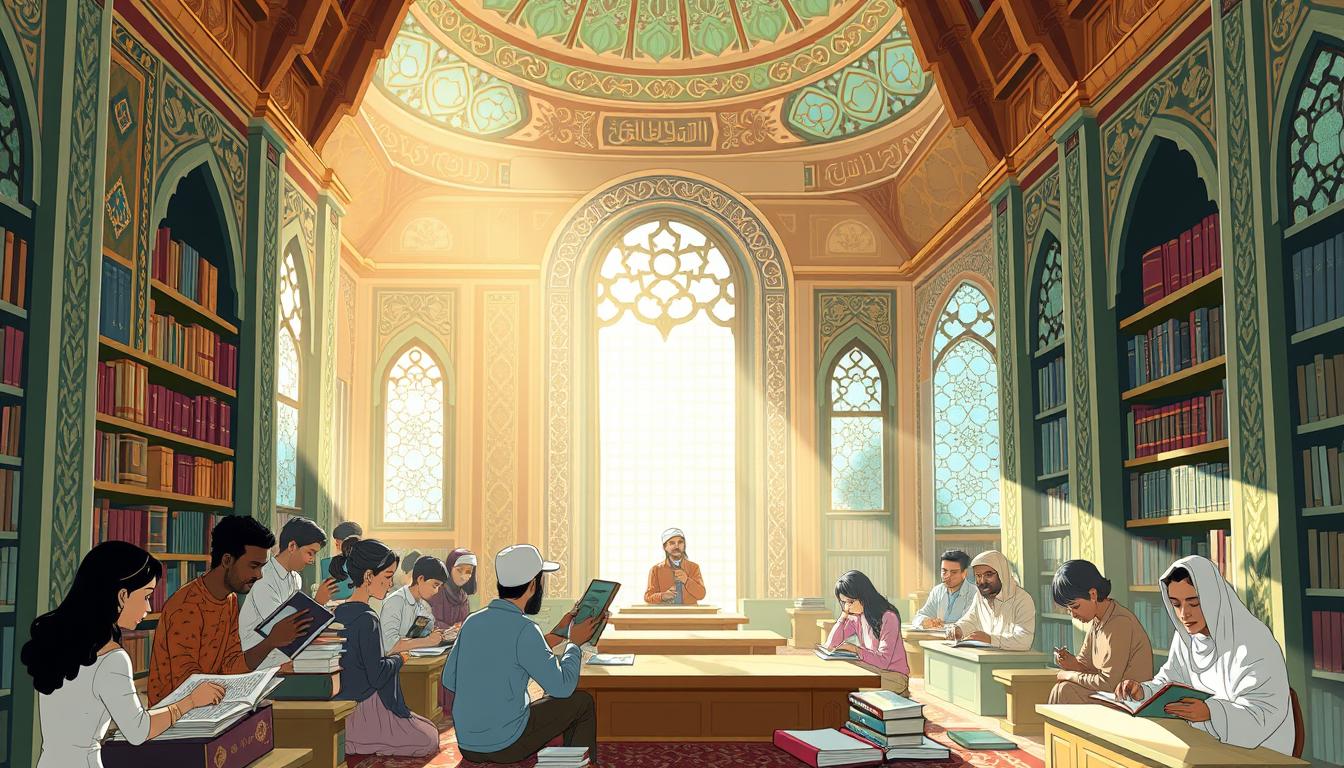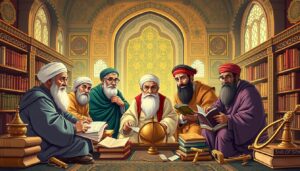In Islam, learning is not just a stage of life; it’s a lifelong journey. It’s deeply woven into our faith and is vital for us. Islamic education stresses the importance of growing both spiritually and intellectually. It encourages us to keep seeking knowledge all our lives. This hunt for knowledge isn’t only for personal growth. It’s a community responsibility that leads to moral growth and helps improve society. When we explore what Islam says about education, we find its importance in the Qur’an and Prophet Muhammad’s teachings. Education opens the door to insight, endurance, and the ability to adapt as the world changes. Thus, it plays a crucial part in creating informed and responsible citizens.
Key Takeaways
- Education is an ongoing obligation for every Muslim, as highlighted by Qur’anic teachings.
- The role of education in Islam is foundational for personal and communal growth.
- Lifelong learning is essential for adapting to modern-day challenges.
- Islamic education integrates both religious and secular knowledge.
- Access to education respects inclusivity, promoting opportunities for all.
Introduction to Islamic Education
Islamic education deeply affects both people and communities. It offers a guide for personal growth and helping society. By understanding what Islamic education means, we know it combines religious and everyday knowledge. This shapes education’s importance in Islam by growing our minds, character, and social skills.
Definition and Significance
The definition of Islamic education covers learning that makes us better all-around. It prepares us to live with honesty, purity, and strong morals. Also, Islam’s teachings remind us we’re all equal, no matter our background. This idea brings students of different cultures together, promoting equality.
Historical Context of Education in Islam
Going back to the 7th century, education in Islam has been crucial since the Islamic Empire began to grow. In the 8th century, places called Bimaristans were the centers for higher learning, especially in medicine. Then, the Al-Mustansiriyah School in Baghdad started. Many see it as an early university in the Muslim world.
During this time, Islamic education led to big achievements in philosophy, medicine, and sciences. This shows the rich knowledge shared through Islamic learning.
The Qur’an and Knowledge
In the Qur’an, education is a core theme that deeply influences our view on learning. It teaches that gaining knowledge is crucial for all Muslims, not just something nice to have. Key verses point out the importance of knowledge for both our spiritual and daily lives.
Key Verses Promoting Education
The Qur’an starts with an instruction to read, showing how vital education is. The verse “Read! In the name of your Lord who created.” (Quran 96:1), begins the path toward gaining wisdom. Another verse, “Allah will raise those who have believed among you and those who were given knowledge by degrees.” (Quran 58:11), shows that educated people hold a higher status.
It’s also a shared duty to learn, as told in prophetic traditions. The Prophet Muhammad (ﷺ) said, “Seeking knowledge is obligatory upon every Muslim.” (Sunan Ibn Majah 224). This rule applies to everyone, showing that men and women alike should pursue education. The prayer, “And say, ‘My Lord, increase me in knowledge.'” (Quran 20:114), encourages us to keep learning throughout life.
The Role of Prophetic Traditions
Prophetic traditions add depth to Islamic education views. Learning is seen as a divine blessing, with high respect for scholars. For example, “The ink of the scholar is more sacred than the blood of the martyr.” (Sahih Muslim 1679a) shows how respected scholars are. The Prophet (ﷺ) also stressed teaching women, as it benefits the moral guidance of the next generation.
History teaches us about the value of literacy, like during the battle of Badr. Captured soldiers could earn freedom by teaching others to read and write. This not only underlines literacy’s role in freedom but also its impact on strengthening communities.

The Five Pillars of Islam and Education
The five pillars of Islam are key acts of worship that guide Muslims in life, including education. These beliefs show how learning is part of our worship. They stress on personal growth and helping society.
Connecting Islamic Principles to Learning
Islamic principles on learning are shown in each of the five pillars. They promote constant learning and understanding. For example:
- Shahada (Declaration of Faith): Realizing God’s oneness teaches us to learn about Him and the universe.
- Salah (Prayer): Daily prayers remind us of the discipline needed for learning, blending spiritual reflection with studies.
- Zakat (Almsgiving): Giving to others helps strengthen community bonds. It shows how education can uplift the needy.
- Sawm (Fasting): Fasting builds self-control, essential for both spiritual and educational success.
- Hajj (Pilgrimage): Making the pilgrimage highlights learning as a lifelong journey.
Education as a Form of Worship
In Islam, education goes beyond just a worldly pursuit. It is deeply tied to education as worship. Learning aligns with our beliefs, making knowledge a way to serve Allah. A large number, about 73% of Muslims, see learning as rooted in Islam and ongoing.
Recognizing education’s value, we should back efforts that promote both religious and secular learning. In many Muslim regions, up to 90% of schools blend in religious studies. This blend helps us meet our duties and cultivate morally responsible citizens dedicated to the good of society.
Types of Knowledge in Islam
Islam values knowledge greatly, shaping both our spiritual and worldly lives. Knowing the different kinds of knowledge in Islam shows their importance and how they connect. There are two main types: religious knowledge and secular knowledge. Both are key to growing as individuals and community members.
Religious vs. Secular Knowledge
Religious knowledge involves Islam’s core teachings, like tauheed, the five pillars, and Shariah laws. It helps us make choices that match Islamic teachings, boosting our faith and spiritual journey. The Quran talks a lot about knowledge, using words like “alim” and “al-‘ilm.” On the flip side, secular knowledge covers areas like medicine and engineering. It gives us the skills we need to help our society. Islam pushes us to learn both, understanding their value in our lives.
The Value of Both Forms
Knowledge in Islam is deeply meaningful because it shapes our purpose and responsibilities. Combining religious and secular knowledge helps us make smart choices for our benefit and our communities. Seeking knowledge broadens our understanding and pushes us to be our best. The Quran labels Allah as “All-knowing,” reminding us that learning is a lifelong journey. Getting into both religious and secular studies creates well-balanced people who positively impact society. Islamic tradition teaches that a little knowledge is worth more than a lot of worship, placing high importance on learning in our lives and societies. To dive deeper, check how these ideas show up in Islamic history, as shown in this source.

Lifelong Learning in Islamic Culture
Lifelong learning in Islam is rooted in a rich history. It’s inspired by scholars like Ibn Sina and Al-Farabi. These figures show the relentless pursuit of knowledge that inspires us today.
Historical Examples of Scholars
Many scholars in Islam left a mark on various fields because of their love for learning. They show how important education is for leaving a lasting legacy. Despite challenges, they were devoted to learning and teaching others.
They showed us that learning isn’t just in classrooms. It’s a lifelong journey. Their work encourages us to keep seeking knowledge and growing.
Modern Perspectives on Continuous Education
In our fast-moving world, Islamic education keeps evolving. It adapts to include new technologies and methods. This makes learning more accessible for everyone.
By using online platforms, we can reach more people. This approach honors the tradition of lifelong learning. It reminds us that learning is important at every age.
The Role of Teachers in Islam
Teachers play a crucial role in the spiritual and intellectual growth of students in Islam. They are not just educators but also role models for moral values and ethics. Their teachings help shape a student’s sense of responsibility for life.
Ideal Characteristics of an Educator
Teachers in Islam act as moral guides. They have key traits that make them effective:
- Patience: This trait helps teachers support students as they learn.
- Integrity: Being honest and fair builds trust with students.
- Compassion: Kindness makes students feel at ease with their teachers.
- Knowledgeable: Understanding their subjects well strengthens teacher-student connections.
- Role Model: Showing good behavior encourages students to act ethically too.
The Teacher-Student Relationship
The bond between teachers and students is key to learning. It’s based on mutual respect and trust. This makes students feel safe to express themselves.
In such an environment, students learn more about their faith and the world. A good teacher-student relationship makes education more exciting and meaningful.
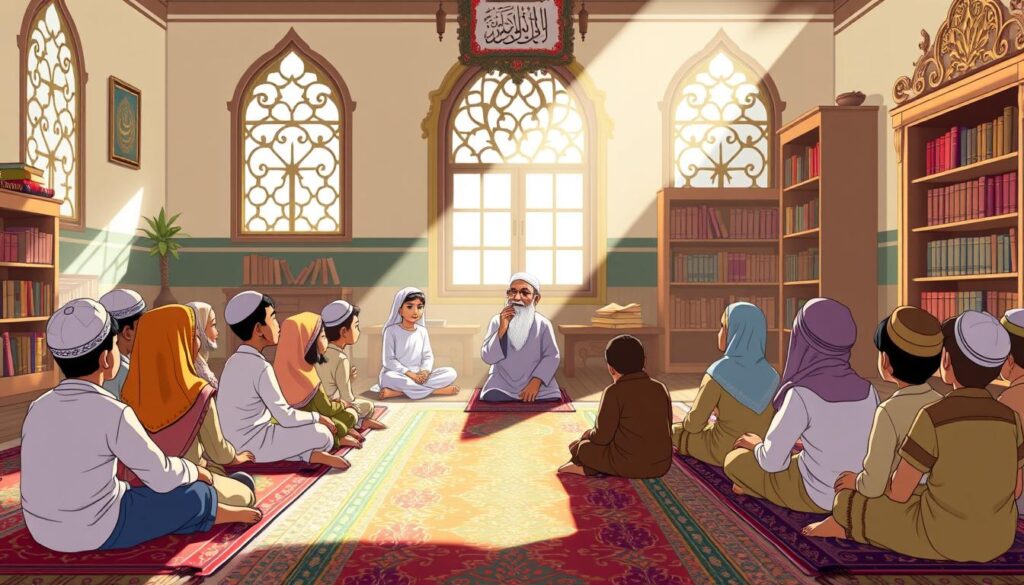
Education for Everyone: Inclusivity in Islam
We see the essence of education in Islam places a big focus on inclusivity. It makes clear that learning shouldn’t be limited by gender or age. Everyone, no matter their background, should seek knowledge. This approach builds stronger communities and promotes ongoing growth.
Gender Equality in Education
Islam has always supported equal chances for men and women in education. Women have been educators and students throughout history. Figures like Fatimah, the Prophet Muhammad’s daughter, have shown women’s impact in education. This shows the need for equal chances for everyone, which helps us all understand our faith and the world better.
Education for All Ages
Islam sees education as a lifelong path for people of all ages. It tells us that from young to old, everyone has the right and need to learn. This idea means learning isn’t just for a certain time in life but goes on forever. By valuing education at every age, we create a world rich with knowledge and experiences. This allows everyone to help society grow.
| Age Group | Education Objectives | Benefits |
|---|---|---|
| Children | Foundational knowledge and skills | Develop critical thinking and moral values |
| Youth | Advanced learning and career preparation | Empowerment through skill-building |
| Adults | Personal development and community involvement | Enhanced social contributions and lifelong engagement |
| Seniors | Continued learning and sharing wisdom | Strengthened community ties and intergenerational skills transmission |
The push for inclusivity in Islam shows learning is everyone’s responsibility across all groups. By supporting these ideas in our communities, we help create a smarter, kinder world.
The Impact of Islamic Education on Society
Islamic education plays a big role in shaping our communities. It teaches people to be ethical citizens with strong values. This kind of education lays the groundwork for teaching kindness, fairness, and how to be socially responsible.
It’s not just about personal growth. Islamic education encourages people to take part and help others, making the community better for everyone.
Developing Ethical Citizens
Our teaching methods build a new generation of ethical citizens. This education is not just about learning facts but also about developing good character. It teaches important virtues for getting involved in the community.
As people adopt these virtues, they learn to act honestly and help society. This leads to positive changes that improve harmony within the community.
Contribution to Community Well-being
There’s a clear link between education and community improvement. Islamic education encourages people to get involved in acts of kindness and support those in need. These efforts create a significant positive impact, making the community a better place to live.
Communities flourish when members are educated and eager to contribute. This highlights the lasting importance of Islamic education in society.
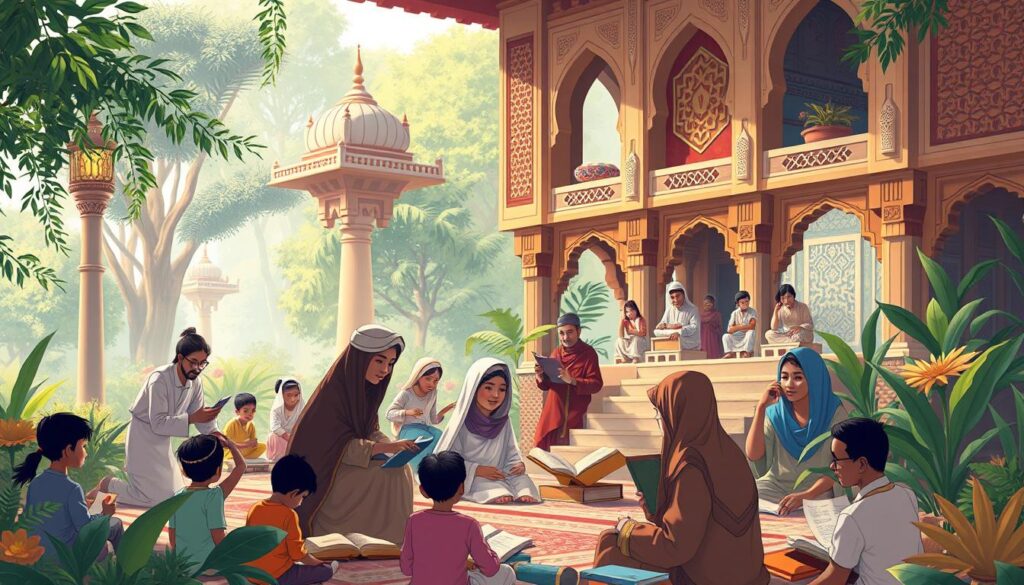
| Impact Area | Description |
|---|---|
| Ethical Development | Students learn values that promote compassion and justice. |
| Community Integration | Engagement in communal activities fosters social responsibility. |
| Social Upliftment | Educated individuals contribute to initiatives benefiting the disadvantaged. |
| Civic Engagement | Islamic education encourages participation in governance and civic duties. |
Educational Institutions in the Islamic World
In Islamic history, educational places have been very important. They’ve helped shape society and spread knowledge. From ancient madrasahs to today’s universities, these places connect old teachings with the new. This shows how Islamic education has changed over time and its big impact on Muslim communities.
The Evolution of Madrasahs
Madrasahs have always been key for Islamic learning, focusing first on religion. Since the 10th century, they have been passing knowledge down through generations. The usual studies included logic, Arabic, law, and understanding the Qurʾān, but not much on other sciences. This helped keep scholars united in their learning.
In Morocco, students studied for 16 years to deeply understand science subjects. Remarkably, women were important teachers in the 12th century. For example, Ibn ‘Asakir was taught by 80 women. This shows madrasahs were open to everyone, setting them apart from other ancient learning places. They prepared the ground for future education changes.
Contemporary Islamic Universities
Now, Islamic universities merge old values with new studies. They teach various subjects but keep close to Islamic teachings. Their goal is to prepare students for different jobs in today’s world. This keeps education up-to-date with global changes.
There are challenges, like modernizing education and moving past old colonial systems. But there’s a push to make Islamic knowledge central again. The Islamic world is working on making changes in education. They want students to be ready for today’s world, with a strong foundation in their beliefs.
The change in Islamic education shows how adaptable and strong it is. Madrasahs and universities are key for Muslim societies’ growth. They help build a generation that blends faith with knowledge, aiming for progress.
Challenges in Islamic Education Today
Islamic education stands at a crucial point today. It needs to adjust to today’s demands while keeping its core ideals. We see many challenges due to the need to meet modern education standards. The rapid growth of information technology and changing cultures require us to think of new solutions.
Addressing Modern Educational Needs
Now, there’s a big difference between just having information and really learning something valuable. With so much online content, it’s tough to know what true learning is. As we aim to offer education that fits with Islamic values, we understand the importance of teaching critical thinking and communication skills for the 21st century.
Some stats highlight this challenge:
| Country | Challenge | Percentage Facing Issue |
|---|---|---|
| Pakistan | Teacher readiness for inclusive education | 55% |
| Indonesia | Curriculum development challenges | 65% |
| International | Cultural barriers faced by students | 60% |
| Malaysia | Student engagement improvement with integrated curriculum | 30% |
Overcoming Stereotypes and Misconceptions
It’s vital to fight stereotypes in education since wrong ideas about Islamic teachings are widespread. By confronting these false narratives, we empower future generations. Moving away from just memorizing facts towards a learning approach that focuses on critical thinking and real-life application will improve education greatly.
Creating a learning environment that welcomes different viewpoints helps challenge stereotypes. This not only makes education richer but also builds tolerance and understanding. The Islamic principle of tabayun — ensuring information is accurate before we accept it — is very relevant. By adopting modern teaching methods and valuing our traditions, we aim to foster a dynamic and transformative educational environment.
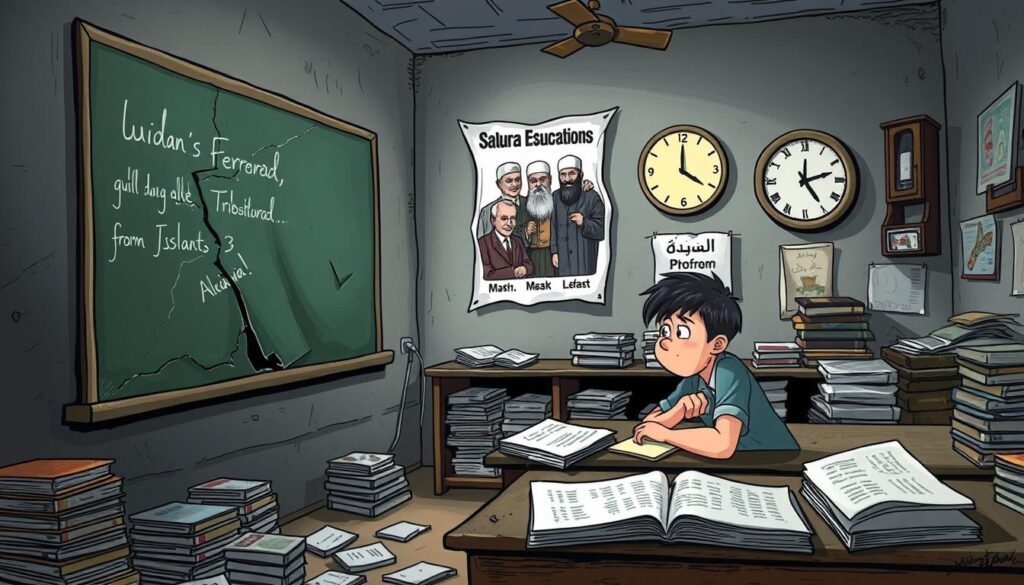
The Future of Islamic Education
When we think about the future of Islamic education, it’s important to look at new ways of learning. These should meet today’s educational needs. Scholars from the 9th to the 14th centuries set the foundation for Islamic education. But today, we need to include critical and scientific thinking.
This means our education systems must change to meet new expectations.
Innovative Approaches to Learning
Islamic education now comes in many forms. These include Quranic schools, weekend schools, homeschooling, and public vocational schools. Around 40% of Muslim students learn in these non-traditional ways. This shows a big change in how we share knowledge. Now, there’s more focus on worldly subjects along with traditional Islamic teachings.
Enrolment in programs that cover both areas has increased by 20%. This shows us that new ideas are shaping Islamic education’s future.
Integrating Technology in Islamic Education
Technology is making Islamic education more suited to different community needs. In places like the U.S. and Germany, Islamic schools are blending local values with new technology. This makes learning more effective. Over 65% of students now study subjects beyond traditional religious teachings. This shows a wide interest in gaining various skills and knowledge.
By accepting this future, we can give learners the tools they need. Skills like critical thinking, creativity, and problem-solving will help them seize global opportunities.
Conclusion: Embracing Knowledge in Islam
In our quest for lifelong learning, knowledge stands as the foundation of our faith and unity. The Qur’an tells us, “Are those who know equal to those who do not know?” (Surah Al-Zumar, 39:9). This encourages us to keep learning and bridge the gap between religious and logical knowledge.
History shows us, especially during Islam’s Golden Age, how combining both core and broad knowledge leads to a full understanding of our world.
We aim to make education a powerful tool in our Muslim community. Whether it’s through helping others, sharing wisdom, or backing educational efforts, we all can shine light on knowledge in our daily lives. We push for learning that grows our spirit and skills, urging everyone to learn in all ways.
We honor Prophet Muhammad’s (PBUH) teachings by always aiming to learn more. This not only helps us grow but also aids our community’s health. Together, let’s make a welcoming place for knowledge that grows our faith and brains, setting an example for the future.

